Related Research Articles
Hīnayāna is a Sanskrit term literally meaning the "small/deficient vehicle". Classical Chinese and Tibetan teachers translate it as "smaller vehicle". The term is applied collectively to the Śrāvakayāna and Pratyekabuddhayāna paths.
An Shigao was an early Buddhist missionary to China, and the earliest known translator of Indian Buddhist texts into Chinese. According to legend, he was a prince of Parthia, nicknamed the "Parthian Marquess", who renounced his claim to the royal throne of Parthia in order to serve as a Buddhist missionary monk in China.
The Golden Light Sutra or Suvarṇaprabhāsa Sūtra, also known by the Old Uygur title Altun Yaruq, is a Buddhist text of the Mahayana branch of Buddhism. In Sanskrit, the full title is The Sovereign King of Sutras, the Sublime Golden Light.

Buddhist texts are those religious texts which belong to the Buddhist tradition. The earliest Buddhist texts were not committed to writing until some centuries after the death of Gautama Buddha. The oldest surviving Buddhist manuscripts are the Gandhāran Buddhist texts, found in Afghanistan and written in Gāndhārī, they date from the first century BCE to the third century CE. The first Buddhist texts were initially passed on orally by Buddhist monastics, but were later written down and composed as manuscripts in various Indo-Aryan languages and collected into various Buddhist Canons. These were then translated into other languages such as Buddhist Chinese and Classical Tibetan as Buddhism spread outside of India.
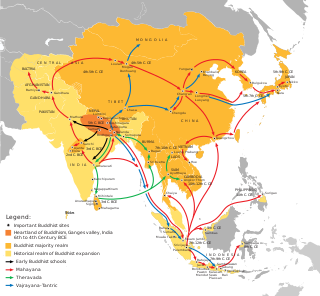
The history of Buddhism spans from the 5th century BCE to the present. Buddhism arose in Ancient India, in and around the ancient Kingdom of Magadha, and is based on the teachings of the ascetic Siddhārtha Gautama. The religion evolved as it spread from the northeastern region of the Indian subcontinent throughout Central, East, and Southeast Asia. At one time or another, it influenced most of Asia.
The Anūnatvāpurnatvanirdeśa is a short Mahayana text belonging to the tathagatagarbha class of sutras.
Victor Henry Mair is an American sinologist. He is a professor of Chinese at the University of Pennsylvania. Among other accomplishments, Mair has edited the standard Columbia History of Chinese Literature and the Columbia Anthology of Traditional Chinese Literature. Mair is the series editor of the Cambria Sinophone World Series, and his book coauthored with Miriam Robbins Dexter, Sacred Display: Divine and Magical Female Figures of Eurasia, won the Sarasvati Award for the Best Nonfiction Book in Women and Mythology.

The Tibetan Buddhist canon is a loosely defined collection of sacred texts recognized by various schools of Tibetan Buddhism, comprising the Kangyur or Kanjur and the Tengyur or Tanjur (Tengyur).
Donald Sewell Lopez Jr. is the Arthur E. Link Distinguished university professor of Buddhist and Tibetan Studies at the University of Michigan, in the Department of Asian Languages and Cultures.
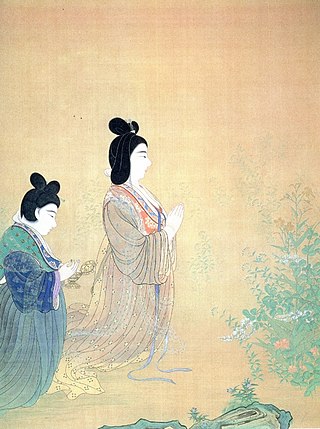
Empress Kōmyō (光明皇后), born Fujiwara Asukabehime, was the consort of Japanese Emperor Shōmu (701–756) during the Nara Period.
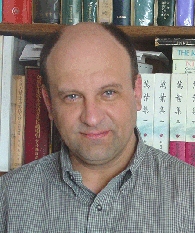
Alexander (Sasha) Vladimirovich Vovin was a Soviet-born Russian-American linguist and philologist, and director of studies at the School for Advanced Studies in the Social Sciences (EHESS) in Paris, France. He was a world-renowned linguist, well known for his research on East Asian languages.

The University of Hawaiʻi Press is a university press that is part of the University of Hawaiʻi.
Edward Kamens is Sumitomo Professor of Japanese Literature at Yale University, where he has taught since 1986. His dissertation focused on the Buddhist setsuwa collection Sanbōe, and more recently he has written on allusive or intertextual language in premodern literature, particularly utamakura in waka. He was Master of Saybrook College and is now a fellow of the Whitney Humanities Center. Professor Kamens and his wife, art history professor and former Saybrook College Master and current Yale College Dean Mary Miller, are rumored to appear as extras in Indiana Jones and the Kingdom of the Crystal Skull, part of which was filmed at Yale.
Christian Konrad Wedemeyer is an American scholar and political and social activist.
Erik Zürcher was a Dutch Sinologist. From 1962 to 1993, Zürcher was a professor of history of East Asia at the Leiden University. He was also Director of the Sinological Institute, between 1975 and 1990. His Chinese name was Xǔ Lǐhe (许理和).
Johannes Bronkhorst is a Dutch Orientalist and Indologist, specializing in Buddhist studies and early Buddhism. He is emeritus professor at the University of Lausanne.
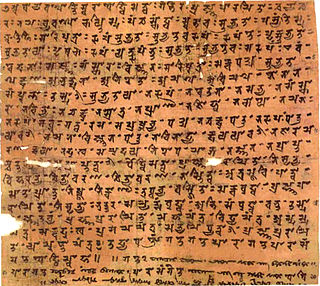
Sanskrit Buddhist literature refers to Buddhist texts composed either in classical Sanskrit, in a register that has been called "Buddhist Hybrid Sanskrit", or a mixture of these two. Several non-Mahāyāna Nikāyas appear to have kept their canons in Sanskrit, the most prominent being the Sarvāstivāda school. Many Mahāyāna Sūtras and śāstras also survive in Buddhistic Sanskrit or in standard Sanskrit.
Bryan J. Cuevas is an American Tibetologist and historian of religion. He is John F. Priest Professor of Religion and Director of Buddhist and Tibetan Studies at Florida State University, where he specializes in Tibetan Buddhist history, literature, and culture. His research focuses on Tibetan history and historiography, hagiography and biographical literature, Buddhist popular religion, the literary history of death narratives and death-related practices, and the politics of magic and ritual power in premodern Tibetan societies, from roughly the eleventh through the early eighteenth centuries.

Gandhāran Buddhism refers to the Buddhist culture of ancient Gandhāra which was a major center of Buddhism in the northwestern Indian subcontinent from the 3rd century BCE to approximately 1200 CE. Ancient Gandhāra corresponds to modern day north Pakistan, mainly the Peshawar valley and Potohar plateau as well as Afghanistan's Jalalabad. The region has yielded the Gandhāran Buddhist texts written in Gāndhārī Prakrit the oldest Buddhist manuscripts yet discovered. Gandhāra was also home to a unique Buddhist artistic and architectural culture which blended elements from Indian, Hellenistic, Roman and Parthian art. Buddhist Gandhāra was also influential as the gateway through which Buddhism spread to Central Asia and China.
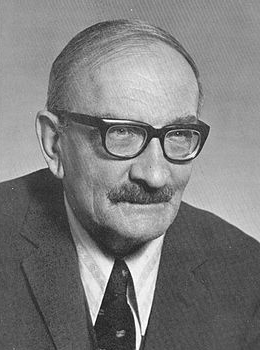
Edward Conze, born Eberhard Julius Dietrich Conze (1904–1979) was a scholar of Marxism and Buddhism, known primarily for his commentaries and translations of the Prajñāpāramitā literature.
References
- 1 2 3 "Jonathan Silk", Leiden University. Retrieved 1 May 2020.
- 1 2 3 "Silk, Jonathan Alan", Dutch Studies on South Asia, Tibet and classical Southeast Asia. Retrieved 1 May 2020.
- ↑ "Jonathan Silk". Royal Netherlands Academy of Arts and Sciences. Archived from the original on 23 August 2017.